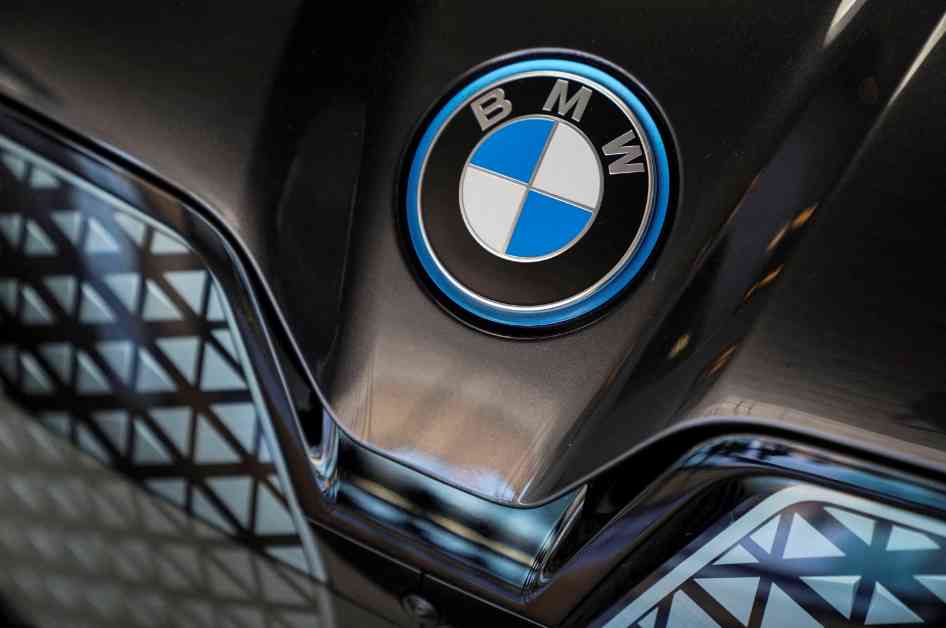German automaker BMW has issued a recall affecting approximately 1.5 million vehicles due to brake issues, leading to a downward revision in its outlook for the year and a decrease in profitability. The announcement has not only impacted BMW’s shares but also caused a ripple effect across other top European automakers, driving their shares down as well.
The recall is expected to have a negative impact on worldwide sales in the second half of the year, as stated by BMW, which encompasses the Rolls-Royce and Mini brands. The financial repercussions for the three months ending in September are estimated to be in the high three-digit million euro range.
This latest setback adds to BMW’s existing challenges, including a weakening demand in China, a significant market for the company. The broader German auto sector has also been facing difficulties, with Volkswagen considering the unprecedented measure of closing factories in Germany.
In response to these challenges, BMW has adjusted its margin of earnings before interest and taxes (EBIT) to a range of 6% to 7% for 2024, down from the previous guidance of 8% to 10%. The company’s shares experienced an 8% decline following the announcement, dragging down the shares of competitors such as Mercedes-Benz, Volkswagen, Stellantis, Porsche Holding, and Renault by 4% to 5%.
The decrease in profitability was attributed in part to headwinds in BMW’s core automotive segment, stemming from delivery halts and technical actions related to the Integrated Braking System (IBS) provided by Continental. The braking systems produced and supplied by Continental to BMW will undergo partial replacement due to an electronic component that may be compromised, resulting in a 6% decrease in Continental’s shares.
BMW also highlighted the ongoing subdued demand in China as a contributing factor affecting sales in the country. Despite government stimulus measures, consumer sentiment in China remains weak, impacting sales volumes. The company anticipates a slight decline in deliveries, although specific figures were not disclosed, after initially projecting an increase.
In 2023, BMW, Rolls-Royce, and Mini collectively delivered 2.56 million vehicles. Last month, BMW recalled 1.4 million vehicles in China due to faulty airbags, further adding to its challenges in the region. The company reported a decline in net profit in the second quarter, attributed to the impact of a sluggish business environment in China and increased manufacturing costs.
During the April to June period, the group’s net profit decreased by 8.6% to 2.7 billion euros ($2.9 billion), with revenues dipping by 0.7% to just under 37 billion euros.
Impact on BMW’s Reputation and Customer Trust
The recall of 1.5 million vehicles for brake issues is not just a financial blow to BMW but also poses a threat to its reputation and customer trust. With safety being a top priority for car buyers, any concerns regarding brakes can significantly impact consumer confidence in the brand.
Ensuring the safety and reliability of their vehicles is crucial for automakers to maintain their reputation in the competitive market. BMW’s response to this recall will be closely scrutinized by both existing customers and potential buyers, as their handling of the situation can either restore or further damage trust in the brand.
Continental’s Role in the Recall
The announcement that a small proportion of braking systems provided by Continental to BMW will require partial replacement due to an electronic component issue sheds light on the interconnected nature of the automotive industry. Suppliers play a critical role in ensuring the quality and safety of components used in vehicles, and any malfunctions can have far-reaching consequences for both the automaker and the supplier.
Continental’s shares took a hit following the news, emphasizing the importance of maintaining stringent quality control measures in the production process. Collaborative efforts between automakers and suppliers are essential to address such issues promptly and prevent similar incidents in the future.
Market Response and Industry Challenges
The ripple effect of BMW’s recall on other European automakers highlights the interconnected nature of the industry and the vulnerability of companies to external factors. The decline in shares of competitors like Mercedes-Benz, Volkswagen, and Stellantis underscores the challenges faced by the entire automotive sector, from market demand fluctuations to supply chain disruptions.
As the industry navigates through economic uncertainties and shifting consumer preferences, automakers must adapt quickly to mitigate risks and maintain their competitive edge. The ongoing impact of the pandemic, coupled with geopolitical tensions and regulatory changes, adds complexity to an already challenging environment for automotive manufacturers.
In conclusion, BMW’s recall of 1.5 million vehicles for brake issues underscores the importance of safety and quality assurance in the automotive industry. The financial implications and market response to this incident serve as a reminder of the sector’s vulnerability to unforeseen challenges. Moving forward, BMW and other automakers must prioritize transparency, customer trust, and collaboration with suppliers to address issues promptly and uphold their reputation in the market.

